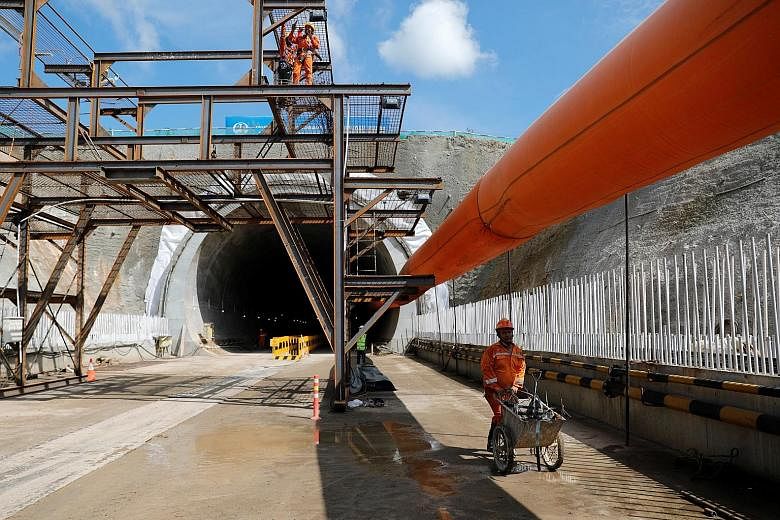WALLINI • In a rural part of Indonesia's Java island, two orange-clad workers confer in Mandarin over plans to lay tracks on a stretch of a US$6 billion (S$8.1 billion) high-speed rail project between the capital Jakarta and the textile hub of Bandung.
Both are employees of the state-owned China Railway Engineering Corp (CREC) and have previously worked on a rail project in Uganda, another part of Beijing's sweeping multi-billion-dollar "Belt and Road" initiative (BRI) to connect China with Asia, Europe and beyond.
Construction on the 142km Indonesian line kicked into high gear last year.
When China hosts its second summit of nations that are part of BRI this week, Beijing is likely to showcase the Indonesian project along with its recent success in getting Malaysia's East Coast Railway Link (ECRL) back on track after months of negotiations.
Analysts say the two projects will be held up as China's answers to criticism about high debt and the lack of transparency in the BRI and its attempt to refocus the programme on sustainable financing and high quality.
The BRI is a key policy of Chinese President Xi Jinping but has been controversial in many Western capitals, particularly Washington, which views it as a means to spread Chinese influence abroad and saddle countries with unsustainable debt.
According to a draft communique seen by Reuters, participants at this week's summit will agree to project financing that respects global debt goals and promotes green growth.
"This bucks the trend of recent negative headlines around the BRI and challenges facing projects in several countries," said Mr Peter Mumford at Eurasia Group consultancy.
-
$6b Cost in US dollars of the high-speed rail project between the Indonesian capital Jakarta and the textile hub of Bandung.
$4.5b Loan in US dollars from China's Development Bank, of the total US$6 billion cost, at 2 per cent interest, according to a project prospectus seen by Reuters. The remaining 25 per cent of the cost will be funded by equity provided by the consortium.
In Malaysia, Prime Minister Mahathir Mohamad agreed to put the 668km ECRL back on track only after cutting the cost of the project from US$16 billion to US$10.7 billion.
"The risk for China is that other countries, having seen Mahathir's success, will try to adopt similar tough renegotiating tactics on BRI projects, which could slow progress elsewhere," said Mr Mumford.
Analysts say China is likely to use its willingness to work with partner nations and make projects feasible to seek more business. Bankers familiar with the deal say the Indo-nesian project is being constructed under "gold-plated terms".
Out of the total US$6 billion cost, China's Development Bank will provide a US$4.5 billion loan at 2 per cent interest, according to a project prospectus seen by Reuters. The remaining 25 per cent of the project cost will be funded by equity provided by the consortium.
The loan will have no sovereign guarantees, which are among the most controversial parts of Belt and Road projects, as they shift risk onto the governments of partner countries.
At the site of the Indonesia rail project, there seems to be no doubt that it will be completed. Workers are directing drilling machines into a hillside, displacing red earth to carve out two tunnels that will lead to the station of Wallini, a tea plantation near Bandung.
President Joko Widodo's government is currently offering up to US$91 billion in infrastructure projects to Chinese companies, according to Mr Luhut Pandjaitan, the coordinating minister for maritime affairs, who said Chinese officials have toured regional governments in search of projects to fund.
Meanwhile, the revival of the Malaysian project is likely to give China hope of securing another train project - the high speed rail (HSR) between Kuala Lumpur and Singapore, which was postponed.
"China will likely take heart from the ECRL outcome and focus their efforts on ensuring that the Kuala Lumpur-Singapore HSR remains on track," said Mr Harrison Cheng, an analyst at Control Risks.
Beijing had been intent on being awarded the project to prove that its rail expertise could win over rivals in a first-world country like Singapore.
Apart from CREC, consortiums from Japan, South Korea, Europe, Singapore and Malaysia are also in the race, if the project is revived.
A source in the Singapore government said Malaysia would have to pay significant penalties to cancel the project altogether.
Dr Mahathir, as well as Singapore Prime Minister Lee Hsien Loong, will take part in this week's Belt and Road summit, which could see China making a renewed push for the project.
REUTERS

